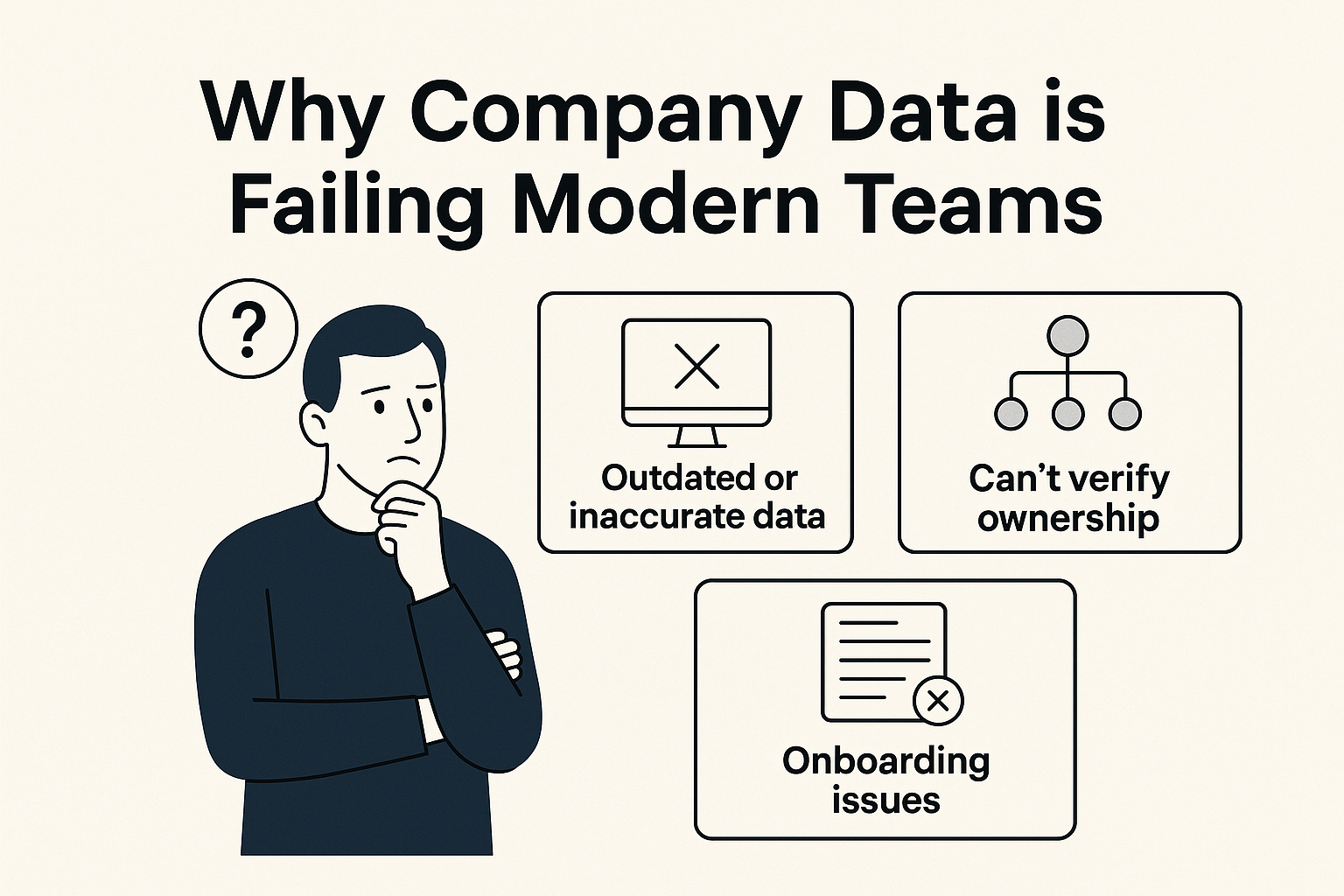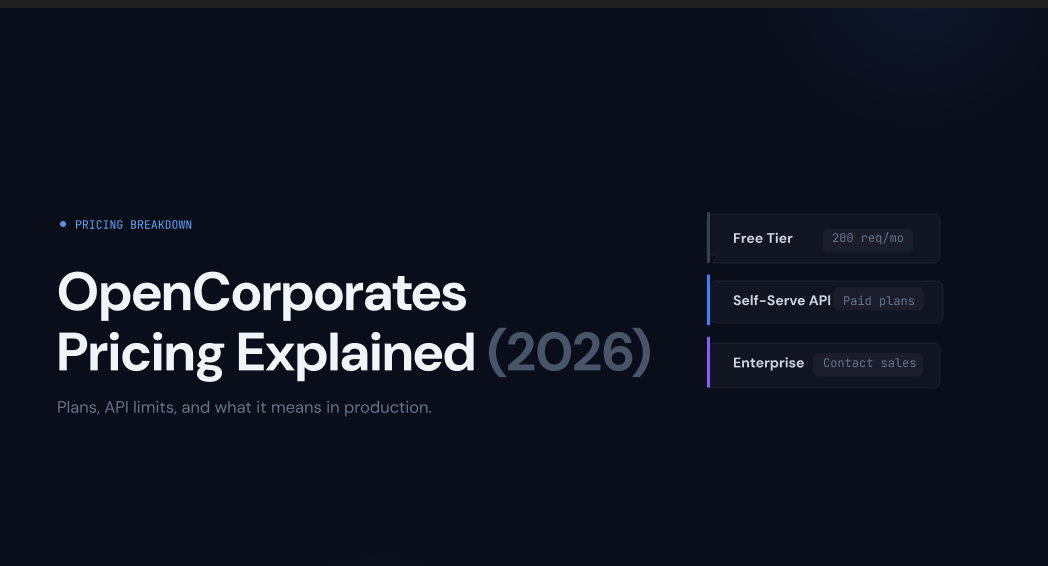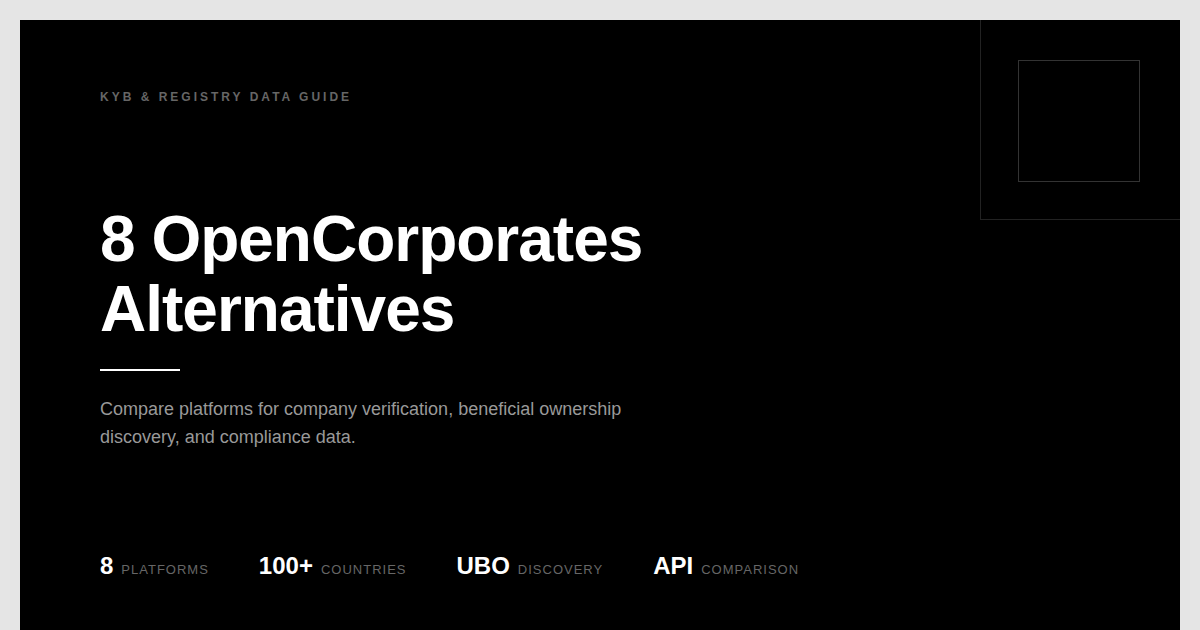
From KYB to GTM: Why Smart Companies Are Moving to Registry-Sourced Data
Why Company Data Is Failing Modern Teams
If you work in product, compliance, or go-to-market, you’ve probably noticed a quiet shift.
The old way of sourcing company data — scraping websites, enriching from LinkedIn, trusting third-party aggregators — isn’t just outdated. It’s breaking critical workflows:
- Sales teams chase accounts that no longer exist
- Compliance teams can’t verify beneficial owners
- Product teams launch onboarding flows that fail mid-process
The problem? Most of today’s company intelligence was never built to be trusted at scale.
That’s why modern companies — from fintech startups to enterprise SaaS platforms — are moving to registry-sourced data. Instead of guessing if a company is real, active, and above-board, they get verified answers directly from the official source: government registries.
This shift isn’t just about accuracy — it’s about building smarter systems.
From KYB onboarding to GTM targeting, registry data offers a defensible, real-time foundation that supports scale, compliance, and performance.
Let’s break down why this transition is happening — and why platforms that don’t adapt will fall behind.
2. The Problem with Most Company Data
Most platforms claiming to offer “company intelligence” are built on a fragile mix of scraped websites, outdated filings, and self-reported details. The result? Teams are making decisions on data that looks right — until it fails.
Scraped, Inferred, and Often Wrong
Websites change. LinkedIn profiles are unverified. Company databases filled with scraped info often miss the basics:
- Is the company actually active?
- What’s their registered legal name?
- Are they part of a larger group structure?
Without registry validation, it’s guesswork dressed up as data.
Inconsistent Standards Across Markets
A “small business” in France might be classified entirely differently than one in Singapore.
Trying to normalize company size, legal form, or industry across borders without local standards is nearly impossible — unless you source directly from the registries that define those standards.
Data Decay and Stale Records
Companies shut down. They merge. They restructure.
But legacy data providers update quarterly — or worse, annually. That creates major risks when onboarding new clients, assessing risk, or defining target accounts.
3. What Registry-Sourced Data Really Means
When we say “registry data,” we don’t mean scraped summaries of public filings or outdated exports. We mean real-time data sourced directly from official government registries — the same systems that determine whether a company legally exists.
Here’s what sets it apart:
Verified at the Source
Registry data is not inferred or user-submitted — it comes straight from national databases that govern incorporation, tax status, ownership, and compliance. You’re not hoping the company is active; you know it is.
Standardized Across Borders
At Zephira, we normalize inputs from 150+ country registries into a single, predictable structure — turning fragmented national formats into usable global intelligence.
For example:
- Legal entity types mapped into a common taxonomy
- Activity status standardized into clear categories (active, dissolved, dormant)
- Company identifiers (e.g., registration numbers, VAT IDs) unified for matching and lookups
Up-to-Date and Time-Stamped
Every record in Zephira’s system is tied to a retrieval date, so your team knows when the data was last pulled from the registry. Some countries update daily, others weekly or monthly — and we reflect that cadence with precision.
Traceable, Auditable, Defensible
When compliance or internal teams ask, “Where did this come from?” — you can point directly to the source. Registry data offers a clear audit trail that scraped or enriched data simply cannot.
4. KYB: Why Compliance Teams Are Making the Shift
Know Your Business (KYB) isn’t just a box to check — it’s a regulatory requirement that determines whether your onboarding process is defensible, efficient, and scalable. The cost of failure is high: regulatory fines, reputational damage, or worse — enabling fraud.
That’s why compliance teams are moving away from stitched-together data vendors and embracing registry-sourced company information as the foundation of their KYB processes.
Proof of Incorporation, Straight from the Source
Instead of relying on outdated PDFs or questionable third-party summaries, registry data delivers:
- Official company name
- Legal form and registration number
- Incorporation date and registered address
- Status (e.g., active, dissolved, in liquidation)
This is the baseline for any serious KYB check — and it comes with source attribution.
Clear Ownership and Shareholding Data
Registry data often includes information on:
- Beneficial owners
- Shareholders and their percentages
- Parent and subsidiary relationships
This is critical for flagging Politically Exposed Persons (PEPs), sanctioned entities, or shell structures — and for understanding control and influence.
Auditable Trails, No Guesswork
Whether you’re preparing for a regulator audit or designing automated onboarding flows, registry data offers transparency. Every datapoint can be traced back to the registry it came from — a must-have for any KYB process that needs to scale without risk.
Automated, Repeatable, API-Driven
With Zephira, KYB checks become programmable. You can trigger company verification, ownership lookups, and document pulls on-demand — without manual review or country-by-country workarounds.
5. GTM: How Product and Growth Teams Benefit
Registry data isn’t just for compliance. It’s quickly becoming a secret weapon for product managers, growth leads, and RevOps teams trying to scale more efficiently.
Why? Because success in GTM — especially in PLG, outbound, or freemium-driven funnels — depends on targeting the right companies, with the right message, at the right time. And that starts with clean, verified data.
Build ICPs on What’s True — Not What’s Scraped
Your ideal customer profile (ICP) is only as strong as the data it’s built on. With registry-sourced data, you get:
- Real revenue estimates and employee bands
- Registered industry codes (NAICS/SIC)
- Company status (active, dormant, dissolved)
- Ownership clarity: target the decision-maker, not the holding entity
This lets you segment based on who a company is, not who they pretend to be on their website.
Better Segmentation and Routing
Want to prioritize fast-growing startups in the UK with <50 employees and no parent company? Or route enterprise leads in Germany that are part of a financial holding group?
You can — but only if your data supports reliable filters and tags. Zephira gives you the verified firmographics, hierarchies, and legal structures to power intelligent GTM workflows.
Trigger Outreach Based on Verified Events
Because registry updates are event-driven (e.g., a company incorporates, changes ownership, updates its financials), you can build GTM plays based on real-world activity — not guesswork.
Examples:
- Send onboarding prompts when a new company registers
- Trigger expansion offers when a client creates a new subsidiary
- Alert sales when a dissolved company comes back online
6. What Scraped Platforms Can’t Offer
Many data vendors market themselves as “comprehensive,” “AI-powered,” or “real-time.” But under the hood, they’re often built on scraped websites, user-submitted data, or inferred logic. That’s not a reliable foundation — it’s a liability.
Here’s where those platforms fall short, and why registry-sourced data wins:
No Legal Defensibility
Scraped data can’t be audited. If your KYB checks fail or your customer segmentation misfires, there’s no way to prove the accuracy of your inputs. Registry data, on the other hand, is verifiable, timestamped, and traceable back to the source.
No Ownership Transparency
Most scraped platforms can’t resolve group structures or ultimate beneficial owners. They provide flat data with no way to see if a company is a shell, a subsidiary, or part of a high-risk network.
Zephira uses registry filings to build out ownership graphs — so you know exactly who’s behind the business.
No Global Standardization
Scraped data lacks consistency. Some companies list revenue, some don’t. Legal forms vary. Industry codes are missing or guessed. Registry data provides structured, harmonized inputs across 150+ jurisdictions — so your systems don’t fall apart as you scale.
No Compliance Peace of Mind
For compliance teams, scraped data introduces risk. For product teams, it introduces friction. For GTM, it introduces waste. Registry-sourced data gives all three the clarity they need to move fast — without sacrificing trust.
7. Zephira’s Approach: Registry Data at Scale
At Zephira, we’ve built our entire platform on one principle: the only source of truth is the source itself. That’s why everything we deliver — every legal name, registration ID, shareholder, or employee estimate — starts with verified government registry data.
Coverage Across 150+ Countries
We connect directly to national company registries around the world — from the UK and Germany to Brazil, Singapore, and beyond. Every record is collected, standardized, and updated according to that country’s official cadence.
Standardized, Enriched, and Ready to Use
Raw registry data is often messy. We make it usable:
- Legal forms, statuses, and industries mapped to unified taxonomies
- Group structures resolved to show parent-subsidiary-UBO relationships
- Enrichment with firmographics like websites, logos, descriptions, revenue estimates, social profiles, and tech stack
- Global identifiers like VAT numbers, LEIs, registration IDs, and DUNS mapped to each company profile
Delivered How You Need It
Whether you’re a startup building onboarding flows or a platform enriching thousands of records per day, Zephira offers flexible delivery options:
- Real-time API access for search, lookup, verification, and monitoring
- Bulk data feeds for full ingestion or large-scale enrichment
- CRM integrations for Salesforce, HubSpot, Dynamics, and more
- KYB-ready compliance tools with ownership mapping and audit trails
You Own the Output
Unlike legacy providers, we give you usage rights that support your business model — including embedding, derivative works, and redistribution, where applicable.
8. Final Thoughts: Registry Data Is No Longer Optional
If your company depends on firmographic data — whether for onboarding, compliance, segmentation, or GTM — then what you rely on must be reliable. Scraped data, guesswork, and stitched-together sources may have worked at small scale, but they collapse under pressure.
Registry-sourced data is different. It’s:
- Trustworthy because it’s verified by governments
- Consistent because it’s standardized across borders
- Actionable because it powers both compliance and commercial use cases
- Defensible because you can trace every datapoint back to the source
Platforms that build on this foundation win trust, move faster, and scale with confidence. Those that don’t? They burn time and money fixing bad data downstream.
At Zephira, we help teams eliminate the noise and build with confidence — from KYB to GTM, and everywhere in between.
9. Frequently Asked Questions (FAQ)
1. What is registry-sourced data?
Registry-sourced data is company information pulled directly from official government registries — such as incorporation, tax, or trade registries — rather than scraped or inferred from public websites.
2. Why is registry data better than scraped or enriched data?
Because it’s verified at the source, timestamped, and traceable. Scraped data often lacks accuracy, legal defensibility, and context like group structures or ownership.
3. How often is registry data updated?
Update frequency depends on the jurisdiction — some countries update daily, others weekly or monthly. Zephira tracks these cadences and surfaces the latest available data for every country.
4. Can registry data help with UBO and group structure analysis?
Yes. Zephira maps out ownership hierarchies, shareholders, and UBOs (Ultimate Beneficial Owners) where available — helping you identify who controls a company across borders.
5. Is Zephira’s registry data available via API?
Absolutely. You can access Zephira’s data via real-time API, bulk data feeds, CRM integrations, or a web interface — whatever fits your workflow best.
6. What use cases does registry data support beyond KYB?
It powers everything from onboarding automation and fraud detection to ideal customer profiling, account-based marketing, territory planning, and more.

